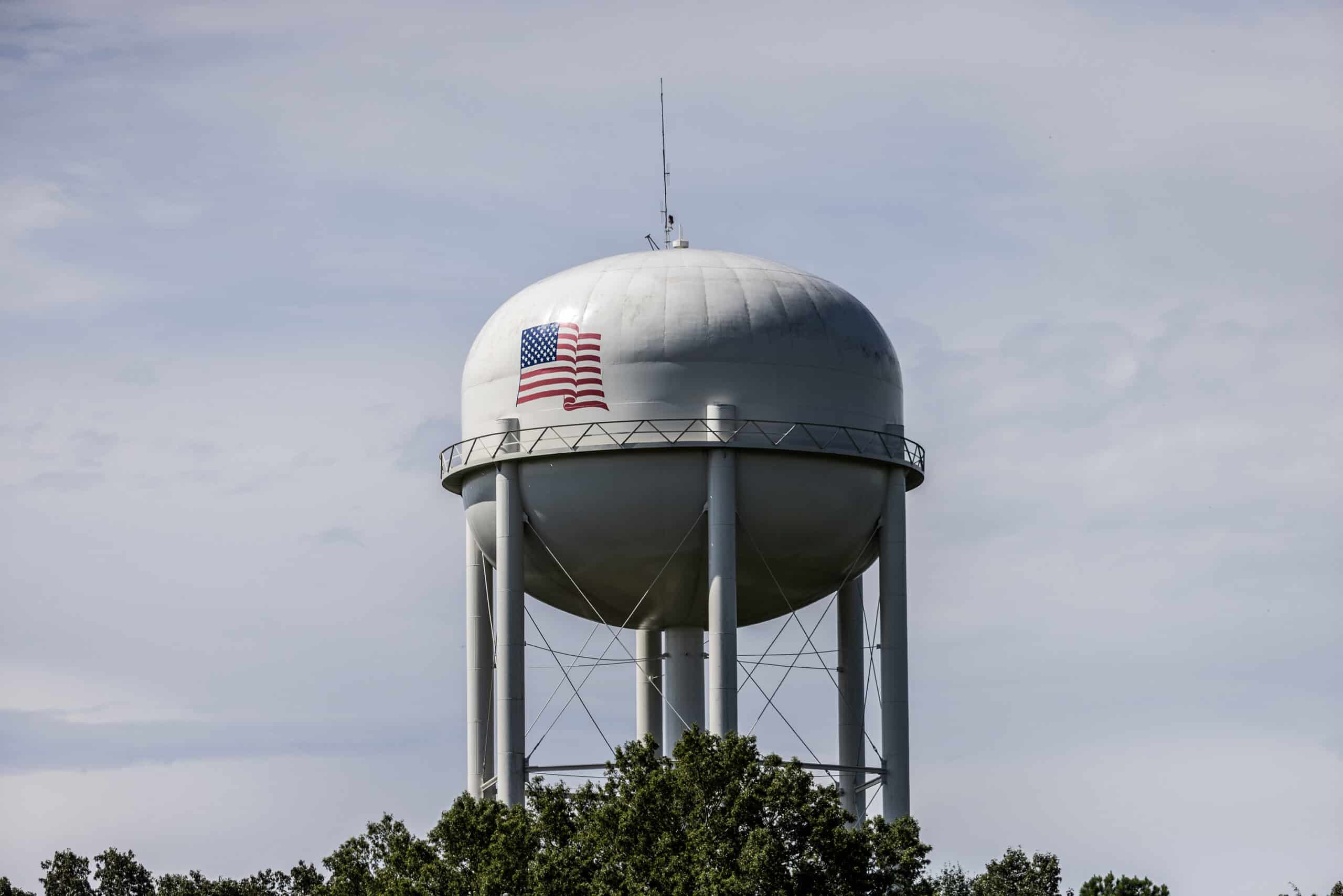Mississippi Today
‘Forever chemicals’ in drinking water are worrying Mississippi residents

If Alabama’s experience foreshadows Mississippi’s future, expect the EPA to find plenty of toxic “forever chemicals” in the drinking water.
A 2022 map shows Alabama with plenty of drinking water exceeding the recommended limit for these chemicals, known as per- and polyfluoroalkyl substances or PFAS. They have been linked to cancer, birth defects, kidney disease, liver problems, decreased immunity, and increased risk of asthma and thyroid issues.
Mississippians remain in the dark about these forever chemicals, however, because the state doesn’t test.
Anna Reade, senior scientist at the National Resource Defense Council, said testing is critical to keeping drinking water safe. “We can’t assume we don’t have exposure to PFAS unless we test,” she said. “Maine found high levels of PFAS in wells that had gone untested for two decades.”
Once hailed for producing items that could resist heat, stains or water, these chemicals are now considered a menace around the globe. Five nations have already agreed to a European ban on PFAS.
Such a ban would cover the thousands of different types of PFAS, which can be found in everything from non-stick cookware to dental floss. The most closely studied PFAS are perfluorooctanoic acid — PFOA — and perfluorooctanesulfonate — PFOS.
Rather than ban all PFAS, the EPA initially put health advisories on those two chemicals at 70 parts per trillion in drinking water, which have since been updated to well under 1 ppt for PFOA and for PFOS. EPA’s newly proposed regulation would limit them to 4 ppt each.
EPA Administrator Michael S. Regan is pushing to reduce current limits because of health problems associated with these chemicals. He said such a change would “prevent thousands of deaths and reduce tens of thousands of serious PFAS-related illnesses.”
A 2020 study suggests up to 200 million Americans are drinking forever chemicals beyond 1 part per trillion — a level that some experts have proposed as a safe limit for drinking water.
Les Herrington, director of Environmental Health for the state Department of Health, discounted the health risks to Mississippians. He pointed to EPA testing in 2013 and 2014, which “all produced results below detection limits and did not indicate potential concerns at that time.”
Recent testing by Consumer Reports, in collaboration with Mississippi Spotlight, however, raises questions about what might have happened since.
Consumer Reports tested 149 drinking municipal and well water samples in Mississippi’s 82 counties. Of those, 146 contained measurable levels of PFAS. Nearly a third of them exceeded EPA’s health advisory for PFOA in drinking water, and almost half exceeded the health advisory for PFOS.

Crystal Dotson, 39, of Corinth and her family saw their drinking water tested at 92.5 ppt in total PFAS, which is far beyond the level of 10 that Consumer Reports recommends. (The EPA has no recommendation on total PFAS, just PFOA and for PFOS.)
She wonders if the forever chemicals have played a role in the declining health of her family since they moved to the city of Corinth a decade ago.
Her 56-year-old husband, Tim, who was in good health, has now developed high blood pressure and polycystic kidney disease. Both hypertension and kidney disease have been linked to these forever chemicals.
Before moving to Corinth, he took blood pressure medicine. Now he’s allergic to that medicine and similar medication.
Their 17-year-old daughter, Stella, is now suffering from two auto-immune diseases, psoriasis and psoriatic arthritis. A series of studies have found exposure to PFAS interfere with immune function.
Their 13-year-old daughter, Veda, had to visit a cardiologist because her heart rate and blood pressure were spiking. “They’re running all kinds of tests,” Dotson said.
She said she believes forever chemicals are playing a role in the decline of her family’s health. “You really feel helpless. Our kids are starting out life sick.”
In 2013, the city of Corinth began to get its drinking water from the Tennessee River via the Tenn-Tom Waterway.
Experts say PFAS can be found at oil refineries, water treatment plants, airports, military sites and a number of industrial sites. From there, the PFAS migrate into streams, landfills or other places before winding up in the soil and drinking water.
Tim believes his family, which also gets their drinking water from the Tennessee River, has been affected. “My brother-in-law has two types of cancer,” he said. “My sister has brain cancer. Everybody in my family has had cancer.”
Many states aren’t waiting for the EPA to act. Bills attacking the PFAS problem have been introduced in 35 states, including Georgia, Florida and Texas, according to Safer States. At least half have taken steps to regulate PFAS in drinking water or expand their monitoring. Mississippi isn’t one of them.
As for Dotson, she isn’t waiting. She plans to talk with the city of Corinth about these PFAS.
Since learning what was in their tap water, the Dotsons have started drinking from store-bought bottles, costing them about $15 a week.

Consumer Reports has identified four water filters, including two pitchers and two under-sink models, that can help consumers filter out forever chemicals.
Some systems, such as reverse osmosis, can cost thousands, which is more than many Mississippians can afford. Even if they can, they might not be able to install such a system, because a third of Mississippians, like the Dotsons, rent their homes.
Crystal hopes the family can convince their landlord to install a reverse osmosis system, she said. “We worry about our children. We want to help them.”
Kelly Hunter Foster, senior attorney for the Waterkeeper Alliance, an environmental advocacy organization, said a more ideal solution would be for states to prohibit the release of PFAS, “rather than try to filter them out on the back end. The public should not have to pay for the pollution that these companies create.”
Mississippi is one of at least 18 states that have sued PFAS manufacturers and distributors, saying they knew “these compounds were toxic” and sold them anyway. The lawsuit, filed in federal court, demands that they pay “to investigate, assess, remediate, monitor, and restore the sites in Mississippi” where PFAS were used. Minnesota settled with one manufacturer, 3M, for $850 million.
Mississippi’s lawsuit identifies these known sites as contaminated: Gulfport Combat Readiness Training Center, Gulfport Naval Construction Battalion Center, Keesler Air Force Base, Columbus Air Force Base, Key Field Air National Guard Base, Jackson Air National Guard Base and Naval Air Station Meridian.
Military bases typically use firefighting foam, which has historically contained PFAs. These forever chemicals can be found in many other places, including fast-food packaging. In a 2022 study, Consumer Reports found PFAS in packaging from every retailer tested.
“Additional investigation and testing will undoubtedly uncover further contamination across the State,” the lawsuit says.
In January 2022, Emmy Morrison and her husband bought their downtown Hattiesburg home.
They found water filters on the faucets because of the lead. She was stunned to find out the bigger problem was PFAS.
Thousands of these forever chemicals exist, but regulators test for only a handful of them.
“Unless you are controlling and testing for all those different types of PFAS, you’re missing major amounts of risk,” said Foster of the Waterkeeper Alliance. “When we look at samples we see some of the highest levels in the rare lesser types of PFAS.”
A decade ago, EPA officials tested for six forever chemicals in 80 of Mississippi’s drinking water systems. This year, they are testing for 29 chemicals in 239 water systems and will release the results here.
Consumer Reports tested for 43 chemicals. That is far short of the thousands of PFAS that exist.
Rather than attack PFAS as a class, the regulatory system in America “is stuck on a toxic treadmill,” said Reade of the National Resource Defense Council. “The EPA has taken a small step in the right direction to get off that treadmill.”
In contrast, the European Union is moving toward phasing out all PFAS, she said. “They’re attacking PFAS at their source. Here, we’re still approving new PFAS.”
The National Resource Defense Council is pushing to reduce “people’s exposure to PFAS,” she said. “We can’t make it zero, but we can definitely reduce their exposure and, therefore, their risk. We need to stop adding to the problem in the first place.”
In Morrison’s home, Consumer Reports found a total of 43.6 PFAS, which is four times more than Consumer Reports’ recommendation of 10.
That concerns the 62-year-old Morrison. “I’m glad I’m not young,” she said.
At least 2,000 people have filed litigation against DuPont, alleging that pollution from the plant has harmed their health, and juries have awarded millions in damages.
In 2005, the EPA uncovered evidence that DuPont had concealed the toxic effects of PFOA, and the company paid a $10.25 million fine, which the agency at the time called the largest environmental administrative penalty in its history.
In 1981, DuPont spotted PFOA in blood samples from pregnant workers in its plant in Washington, West Virginia, and at least one woman had transferred the chemical to her baby, according to the settlement. A decade later, the company learned that the forever chemical was in the public water supply.
DuPont said nothing, and in 2001, the EPA learned of the problem from an attorney working on class-action litigation on behalf of citizens in Ohio and West Virginia who had been affected by the chemical, according to the settlement.
As for House, testing showed total PFAS in her drinking water to be 20.7.
“We’ve got junk in the water,” she said. “I can’t say I’m surprised.”
Before the 74-year-old moved back to her hometown eight years ago, she had a reverse osmosis system for her drinking water in Tampa. Now back on the Mississippi Gulf Coast, she has no such system.
These days, she uses a refrigerator filter on the tap water she drinks. Now she wonders what she needs to do to be safe. “Do I need to bring Perrier from France?” she asked.
She is researching the matter, she said. “I didn’t come this far in life to want to come down with liver cancer.”
This investigation was conducted by Consumer Reports in partnership with Mississippi Spotlight, a collaboration between Mississippi Today, the Clarion Ledger and Mississippi Public Broadcasting.
This article first appeared on Mississippi Today and is republished here under a Creative Commons license.
Mississippi Today
An ad supporting Jenifer Branning finds imaginary liberals on the Mississippi Supreme Court

The Improve Mississippi PAC claims in advertising that the state Supreme Court “is in danger of being dominated by liberal justices” unless Jenifer Branning is elected in Tuesday’s runoff.
Improve Mississippi made the almost laughable claim in both radio commercials and mailers that were sent to homes in the court’s central district, where a runoff election will be held on Tuesday.
Improve Mississippi is an independent, third party political action committee created to aid state Sen. Jenifer Branning of Neshoba County in her efforts to defeat longtime Central District Supreme Court Justice Jim Kitchens of Copiah County.
The PAC should receive an award or at least be considered for an honor for best fiction writing.
At least seven current members of the nine-member Supreme Court would be shocked to know anyone considered them liberal.
It is telling that the ads do not offer any examples of “liberal” Supreme Court opinions issued by the current majority. It is even more telling that there have been no ads by Improve Mississippi or any other group citing the liberal dissenting opinions written or joined by Kitchens.
Granted, it is fair and likely accurate to point out that Branning is more conservative than Kitchens. After all, Branning is considered one of the more conservative members of a supermajority Republican Mississippi Senate.
As a member of the Senate, for example, she voted against removing the Confederate battle emblem from the Mississippi state flag, opposed Medicaid expansion and an equal pay bill for women.
And if she is elected to the state Supreme Court in Tuesday’s runoff election, she might be one of the panel’s more conservative members. But she will be surrounded by a Supreme Court bench full of conservatives.
A look at the history of the members of the Supreme Court might be helpful.
Chief Justice Michael Randolph originally was appointed to the court by Republican Gov. Haley Barbour, who is credited with leading the effort to make the Republican Party dominant in Mississippi. Before Randolph was appointed by Barbour, he served a stint on the National Coal Council — appointed to the post by President Ronald Reagan who is considered an icon in the conservative movement.
Justices James Maxwell, Dawn Beam, David Ishee and Kenneth Griffis were appointed by Republican Gov. Phil Bryant.
Only three members of the current court were not initially appointed to the Supreme Court by conservative Republican governors: Kitchens, Josiah Coleman and Robert Chamberlin. All three got their initial posts on the court by winning elections for full eight-year terms.
But Chamberlin, once a Republican state senator from Southaven, was appointed as a circuit court judge by Barbour before winning his Supreme Court post. And Coleman was endorsed in his election effort by both the Republican Party and by current Republican Gov. Tate Reeves, who also contributed to his campaign.
Only Kitchens earned a spot on the court without either being appointed by a Republican governor or being endorsed by the state Republican Party.
The ninth member of the court is Leslie King, who, like Kitchens, is viewed as not as conservative as the other seven justices. King, former chief judge on the Mississippi Court of Appeals, was originally appointed to the Supreme Court by Barbour, who to his credit made the appointment at least in part to ensure that a Black Mississippian remained on the nine-member court.
It should be noted that Beam was defeated on Nov. 5 by David Sullivan, a Gulf Coast municipal judge who has a local reputation for leaning conservative. Even if Sullivan is less conservative when he takes his new post in January, there still be six justices on the Supreme Court with strong conservative bonafides, not counting what happens in the Branning-Kitchens runoff.
Granted, Kitchens is next in line to serve as chief justice should Randolph, who has been on the court since 2004, step down. The longest tenured justice serves as the chief justice.
But to think that Kitchens as chief justice would be able to exert enough influence to force the other longtime conservative members of the court to start voting as liberals is even more fiction.
This article first appeared on Mississippi Today and is republished here under a Creative Commons license.![]()
Mississippi Today
On this day in 1968


Nov. 24, 1968

Black Panther leader Eldridge Cleaver fled the U.S. to avoid imprisonment on a parole violation. He wrote in “Soul on Ice”: “If a man like Malcolm X could change and repudiate racism, if I myself and other former Muslims can change, if young whites can change, then there is hope for America.”
The Arkansas native began to be incarcerated when he was still in junior high and soon read about Malcolm X. He began writing his own essays, drawing the praise of Norman Mailer and others. That work helped him win parole in 1966. His “Soul on Ice” memoir, written from Folsom state prison, described his journey from selling marijuana to following Malcolm X. The book he wrote became a seminal work in Black literature, and he became a national figure.
Cleaver soon joined the Black Panther Party, serving as the minister of information. After a Panther shootout with police that left him injured, one Panther dead and two officers wounded, he jumped bail and fled the U.S. In 1977, after an unsuccessful suicide attempt, he returned to the U.S. pleaded guilty to a reduced charge of assault and served 1,200 hours of community service.
From that point forward, “Mr. Cleaver metamorphosed into variously a born-again Christian, a follower of the Rev. Sun Myung Moon, a Mormon, a crack cocaine addict, a designer of men’s trousers featuring a codpiece and even, finally, a Republican,” The New York Times wrote in his 1998 obituary. His wife said he was suffering from mental illness and never recovered.
This article first appeared on Mississippi Today and is republished here under a Creative Commons license.![]()
Mississippi Today
On this day in 1867


Nov. 23, 1867

The Louisiana Constitutional Convention, composed of 49 White delegates and 49 Black delegates, met in New Orleans. The new constitution became the first in the state’s history to include a bill of rights.
The document gave property rights to married women, funded public education without segregated schools, provided full citizenship for Black Americans, and eliminated the Black Codes of 1865 and property qualifications for officeholders.
The voters ratified the constitution months later. Despite the document, prejudice and corruption continued to reign in Louisiana, and when Reconstruction ended, the constitution was replaced with one that helped restore the rule of white supremacy.
This article first appeared on Mississippi Today and is republished here under a Creative Commons license.![]()
-

 Kaiser Health News6 days ago
Kaiser Health News6 days agoA Closely Watched Trial Over Idaho’s Near-Total Abortion Ban Continues Tuesday
-

 Local News5 days ago
Local News5 days agoSherral’s Diner to be featured on America’s Best Restaurants
-

 Local News2 days ago
Local News2 days agoIntroducing our Student Athlete of the Week: Ocean Springs’ very own Mackenzie Smith
-

 News from the South - Georgia News Feed4 days ago
News from the South - Georgia News Feed4 days agoJose Ibarra found guilty in murder of Laken Riley | FOX 5 News
-

 News from the South - Alabama News Feed5 days ago
News from the South - Alabama News Feed5 days agoTrial underway for Sheila Agee, the mother accused in deadly Home Depot shooting
-

 News from the South - Kentucky News Feed4 days ago
News from the South - Kentucky News Feed4 days agoNicholasville organization activates weather plan in response to bitter cold temperatures
-

 News from the South - Alabama News Feed4 days ago
News from the South - Alabama News Feed4 days agoJudge grants mistrial in Sheila Agee trial due to ‘unhinged juror’
-

 News from the South - Alabama News Feed5 days ago
News from the South - Alabama News Feed5 days agoAlabama's weather forecast is getting colder, and a widespread frost and freeze is likely by the …



























